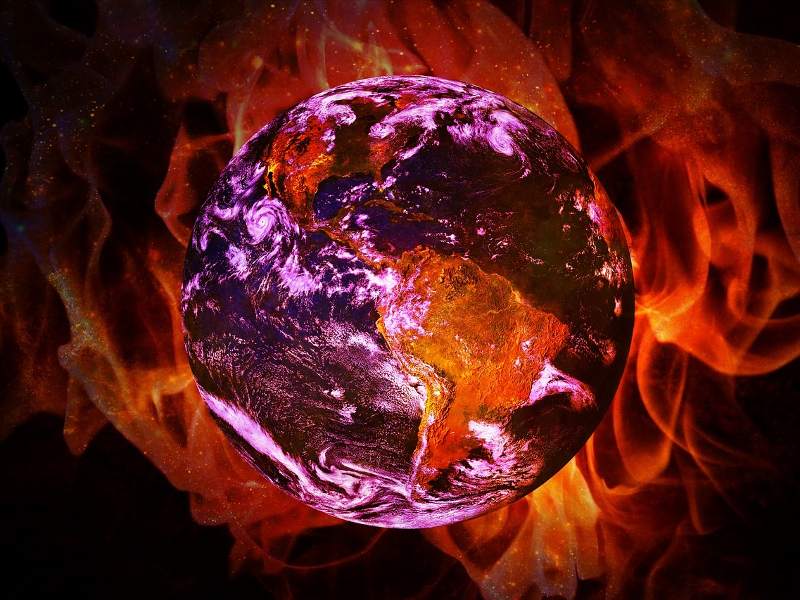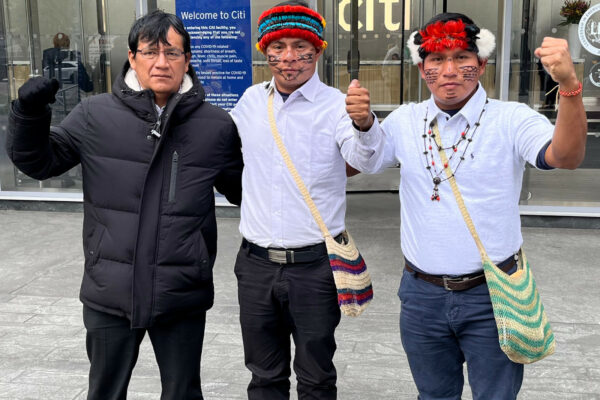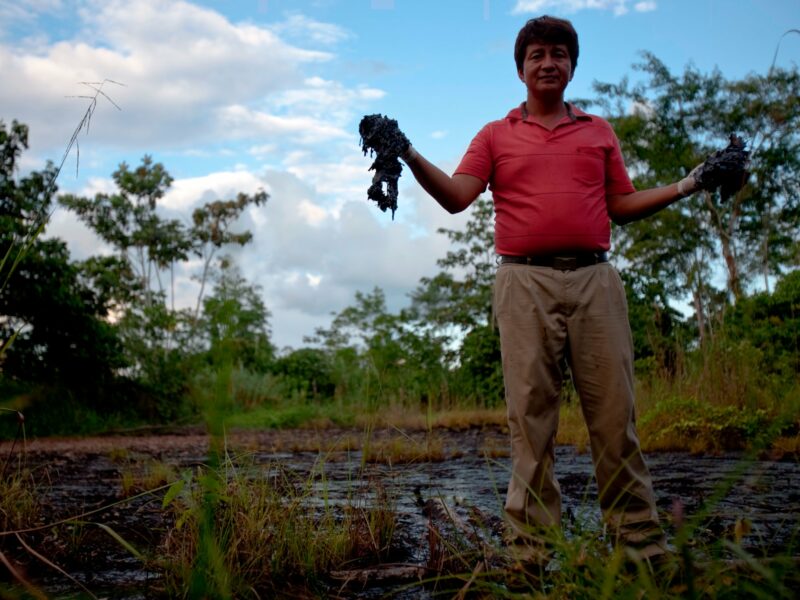
The end of the summer of 2017 couldn’t have been more apocalyptic. Wildfires torched the Pacific Northwest, the Sierras, Los Angeles, and much of the western United States. Temperatures blistered in the Bay Area, breaking all-time records over Labor Day, with downtown San Francisco hitting a sweltering 106 degrees.
Texas and Louisiana are years away from recovery after getting soaked with 27 trillion gallons of water. The Caribbean is reeling. Florida is assessing the damage and counting its blessings, as another hurricane churns away offshore. Meanwhile, major monsoons and floods left a third of Bangladesh and huge swaths of India and Nepal underwater.
Make no mistake: the extreme climate disruption we saw at the end of summer is fossil-fueled. Surely wildfires, hurricanes, and floods are natural. But the intensity and frequency of these events in a world that has already warmed more than 1.1°C since the 19th century should leave us all shuddering about what may be to come if we don’t act now. Most of the warming has occurred in the last 35 years, with sixteen of the last seventeen being the hottest on record. The solution couldn’t be more obvious: It has never been more urgent, more necessary, more logical to keep fossil fuels in the ground.
The science says we need to keep two-thirds of all oil in the ground to keep from hitting 2°C and have a fighting chance at avoiding the catastrophic effects of climate change. But if this summer is any indication, we’re already in trouble. The groundbreaking 2016 report The Sky’s Limit from our friends at Oil Change International reminds us of the old adage, “When you’re in a hole, stop digging.” We need to stop digging. Yesterday.
Emissions from existing oil, gas, and coal reserves will take the planet beyond 2°C. The report explains the need for a managed drawdown of existing reserves, as well as a halt to all new exploration. Because if we know now that we can’t use the reserves we already know about, then why are we looking for more in places critical to climate stability like the Amazon or the Arctic?
In fact, the report lays out the disturbing reality that, Paris Accord aside, governments and companies are building infrastructure and upstream reserve expansion that will miss the agreed-upon targets by a long shot. And banks and financiers are more than willing to bankroll a path to a world that’s 6°C hotter.
If it feels like it’s getting worse, it is. According to the National Oceanic and Atmospheric Administration and the National Climate Assessment, large fires will increase sixfold in parts of the West. The fire season is already 78 days longer than it was in 1970. A rapidly warming planet of extreme heat and disease is exacerbating what is a natural part of the life cycle of a forest. Meanwhile, in other parts of the U.S., extreme rain storms are up by a third since 1980, as warmer air from land and sea carries more water.
As Hurricane Harvey settled in over Houston, we saw what can happen when wetlands are destroyed for development and decades of operations of the nation’s largest petrochemical corridor go unregulated. Transport, dumping, and flaring from the petrochemical industry have long been a source of chronic health problems for local communities. But now floodwaters have brought the area’s toxic legacy to the surface. Local residents face wading through polluted floodwaters and a clean-up of lingering mud and sediment laced with arsenic, lead, and other heavy metals and carcinogens.
The fact that major oil, gas, and chemical infrastructure got raked by Harvey might seem like an industry comeuppance, but of course it’s not the companies that pay. Harvey’s economic impact is estimated to top $160 billion, but ongoing subsidies to the fossil fuel industry offset their losses. The price of climate change is being paid by frontline communities of color in Houston, indigenous peoples, island nations, and the other 98% who bear the brunt of catastrophes like this. If we don’t act boldly and fast, this will be the new normal. But shouldn’t the industry be on the hook for causing the problem in the first place?
A new study in the journal Climate Change unmasked the climate villains, for the first time directly linking increase in temperature with emissions from specific companies. According to the study, 30% of global sea rise between 1880 and 2010 comes from a list of just 90 culprits with the largest greenhouse gas footprint, with a whopping six percent coming from ExxonMobil, BP, and Chevron alone.
And guess who was the worst of the worst? Yep, it’s Chevron topping the list. It’s almost hard to believe since they left so much of their oil and waste byproducts from the drilling process on the floor of the Amazon rainforest and indigenous territories in Ecuador. But apparently they managed to get some oil into pipelines elsewhere.
Given the direct hit on the districts of vocal climate deniers in Texas and Florida (who also voted against federal aid for previous hurricane aid for residents of New Jersey and New York after Sandy – looking at you Ted Cruz), you’d think it would be an ideal time to talk about climate change right? Wrong.
Scott Pruitt, head of the Environmental Protection Agency said it was “insensitive” to talk about climate change during the storms. Wouldn’t it seem like exactly the appropriate time to talk about what is causing and exacerbating the deadly and costly climate events striking the United States? Of course these are the same people who don’t want to talk about gun control after a mass shooting. It’s the right’s only response when inconvenient truths, science, and reality intrude upon their upside-down world. Florida Governor Rick Scott, now governing a state whose six million people were left without power immediately after Hurricane Irma, banned the use of the term “climate change” in official government documents and proposals, leaving scientists thumbing through the thesaurus and tapping their creative writing skills when producing proposals to bolster infrastructure or other preventative measures to help the state withstand the predicted rise of sea levels and increase in major hurricanes.
But before we all fall into a severe tropical depression, there is good news to report!
Three California counties sued 37 fossil fuel companies over the summer for knowingly emitting greenhouse gases that are causing sea level rise and threatening communities. Meanwhile, the investigations by two state attorneys general over Exxon’s knowledge and subsequent public denial and shareholder deceit on climate science are ongoing. Shareholders recently rebuked Exxon management and forced the company to disclose the impact compliance with climate change regulations would have on its business. And let’s not forget the game-changing lawsuit Juliana v. U.S. brought by youth who assert that the actions of the U.S. government have led to climate change, which threatens basic rights of the new generations to life, liberty, and property, among others. The case is pending before the U.S. District Court in Oregon.
Last week, France committed to ending new oil leases and a total phase-out of fossil fuel production by 2040. China followed by announcing that it will replace all fossil fuel-powered cars by 2040, which sent ripples through the auto industry and lends credence to the notion that the twilight of the fossil fuel industry is upon us, as efficient, affordable electric vehicles supplant gas guzzlers and oil and gas producers face predictions of low prices for years to come. A recent Stanford University study boldly predicts that the market will usher in the end of new fossil fuel cars in the next eight years.
On September 7th, Rep. Tulsi Gabbard (HI), joined by Representatives Barbara Lee (CA), Jamie Raskin (MD), Nanette Diaz Barragán (CA), Ted Lieu (CA), Jan Schakowsky (IL), and Keith Ellison (MN) introduced the OFF Fossil Fuels for a Better Future Act (HR 3671), the strongest climate change legislation to date. Importantly, it would end federal fossil fuel subsidies and put a moratorium on new major fossil fuel projects, require elimination of fossil fuels without interim marketplace avoidance mechanisms like cap and trade that have proven ineffective in significantly reducing emissions, and provide for a just transition with a focus on environmental and economic justice for communities.
Meanwhile, civil society continues to push the envelope on what’s needed. The unprecedented Lofoten Declaration, named for the idyllic archipelago of islands off the coast of northern Norway where a de-facto moratorium exists on new drilling despite reserve estimates worth $65 billion, was signed by 340 organizations from 67 countries and demands a managed decline of the fossil fuel industry, starting with the North. We need leadership from countries that not only bear great historic responsibility for climate change, but have also benefited greatly from fossil fuel extraction and have economies that are well poised to switch to renewables and a just transition for communities and workers.
Yes, we will continue to work to beat back the apocalypse. And we also need to fight back, both here at home and in support of the communities on the front lines of the fossil fuel frontier who are fighting to save their territories, lives, and our climate.













